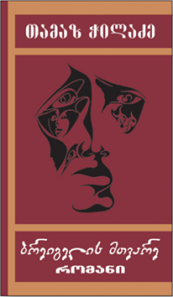THE BRUEGHEL MOON
‘...And while the connections between the three characters are surprising, what’s more is the way Chiladze beautifully weaves together a number of themes, including “the unbearable loneliness” that waits “at home, crouching in ambush,” the pain of the illusion of love, and how “one needs an attentive, sensitive listener” in order to move from an old life to a new one. The result is a work as complex as the human psyche and as powerful as the heart.’
EXRACT
Translated into English by Maya Kiasashvili
And she was gone. Lost like a stone thrown into the water. I spent the next three months in a limbo-like state. To be honest, I never thought the whole thing would affect me to such an extent. Not only affect but actually hurl me out of my normal life. Not im-mediately, but gradually everything seemed to have lost meaning, faded out. I went to work, answered phone calls, but it was pretty mechanical. Judging from my actions and speech it might have been hard to detect the changes which I clearly felt. Apparently no one noticed otherwise they would have told me, indicated in some way. Of course, all my friends and family as well as my co-workers knew about my family drama. People are interested in such things. But they refrained from discussing it with me, which is understandable. However, I felt everyone wanted to hear the story fi rst-hand, to find out what happened in a seemingly quiet, typical Tbilisi family.
I could see something was very wrong with me. It looked like the onset of a nervous breakdown, but I couldn’t defy it. And still, most upsetting were the dreams, visions, or images either caused by my depressed mood or the other way round—intensified my dejected state with a strange sequence of a serial. When alone, whether asleep or awake, I saw the world differently, heard differ-ent voices. Th e most painful was occasionally picturing myself as a helpless old man. I desired to confess to someone how one feels when abandoned, left alone with oneself, how bitter and dejected— I didn’t want to use the word but here it is—a madman can be. I wished to share it as a secret, which might have been heard out with pleasure, while I would shake it off and feel free not so much from solitude, which is virtually impossible, but of the visions triggered by solitude, which forced me to dwell in another, non-real world.
I thought if I opened the door, an alien, vicious element would dash in like a masked soldier that filled our TV screens. And he would demand the most precious thing I had. I’d gladly give it, but the problem is I don’t know what I hold as the most precious and, generally speaking, what is most precious for people? Does anyone know?
Throughout those three months, in my dreams and my wake-fulness, tapping on the door accompanied my state of deep depression constantly... (See PDF)
In case of using the information, please, indicate the source.
